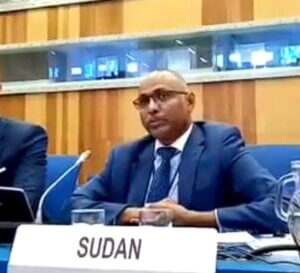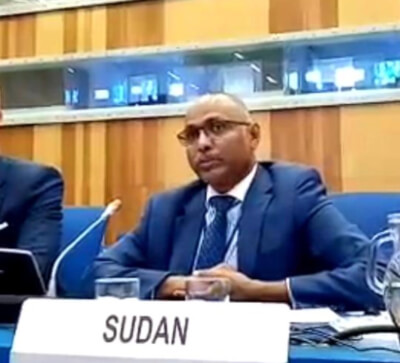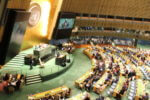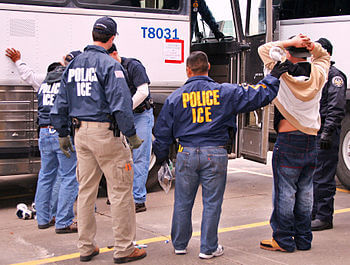Reviving the Bread-basket Strategy: The Backbone of Sudan’s Recovery
By Magdi A. Mofadal
Sudan’s humanitarian partners have recently rung the alarms about the situation of food insecurity in the country, particularly in Darfur, due to the conflict that started on the 15th of April,2023.
The war erupted when farmers were preparing for the rainy season, in which about 95% of the cultivated land across the country is tilled.
It interrupted the urgently needed finance, obstructed transportation, impacted trade, and diverted the attention away from production.
This further complicated a very a fragile humanitarian situation in the country.

The humanitarian situation in the region is also posing several challenges. The UN humanitarian agencies warned in June 2023 that climate change, armed conflicts, high food prices and post-COVID-19 economic fall-out have caused record food insecurity in the Horn of Africa, with an estimated 60 million urgently in need of help.
The gravity of the current humanitarian situation, in Sudan and the region, requires the search for sustainable solutions that will address not only the current crisis but will build a solid ground for the future. This can only be achieved through reviving the 1970s bread-basket strategy, which aimed at transforming Sudan into a leading agricultural producer in Africa and the Arab World. The United Nation’s Food and Agriculture Organization (FAO), based on a World Food Conference in 1974, considered Sudan, with Australia and Canada, the future breadbasket of the globe. The East African country was projected to be one of the largest agricultural powerhouses globally.
This was based on several factors. An arable land of 170 million acres, out of which only 40 million acres are currently used (less than its quarter). Most of these vast fertile lands has the potential for irrigation, from the river Nile and its tributaries, seasonal streams, and vast aquifers. In addition to adequate rainfall, different climates, 110 million heads of livestock (cattle, goats, sheep, and camels). Its diverse climates enable Sudan to produce vast array of crop varieties including cereal grains (wheat, millet, and sorghum), groundnuts, sugarcane, beans, vegetables, and fruits (mangoes, lemons, oranges, and grapefruits). The Nile and the Red Sea provide Sudan with huge potential in the fishing industry.
Political instability, long and devastating internal conflicts, strains in the country’s relations with some actors in the international community, mismanagement of resources, and lack of vision are among the major factors that deprived the country from achieving its bread-basket strategy.
A golden opportunity to revive the breadbasket strategy
A lot of water has passed under the bridge of this strategy in the last 50 years. The secession of South Sudan with its huge resources of water, lands, and forests; climate change; drought and desertification; population growth; migration to urban areas; the prevalence of the culture of seeking quick income; and the neglect of the agricultural sector.
Despite all these factors and the unprecedented looting, destruction, sabotage, and razing of economic institutions in the current war in Sudan, there are several local, regional, and international factors that encourage investment in agriculture and agribusiness and pave the way for reviving the bread-basket strategy. These will be outlined in the following points.
Most of the infrastructure and facilities of the agricultural sector has been spared the devastation by the current conflict. The sector outside Khartoum, Darfur and North Kordofan states can be swiftly and easily revitalized. This will contribute to achieving food security, create jobs, and provide goods and services to the manufacturing, trade, and transport sectors. This in turn will reflect positively on economic growth, reducing the deficits in the trade and the balance of payments, reducing inflation, and stabilizing the exchange rate.
Fortunately, each one of the 18 states of Sudan has a comparative advantage in one or more of the subsectors of the agricultural sector: crop production, animal husbandry, forests, and water resources. Therefore, revitalizing the agricultural sector will contribute to achieving balanced regional development, sustaining peace, and enhancing national unity, as regional disparities are among the main factors behind internal conflicts in the country.
Most of the areas in the peripheries of the country have been connected by paved roads to the centre and the main port. There are also roads to Eritrea, Ethiopia, Egypt, and South Sudan. This in turn will ease access to markets within and without the country, and access to inputs, raw materials, and capital goods.
The advancement in scientific research and technology provides huge opportunities to increase productivity, introduce new varieties, enhance efficiency in water consumption and introduce new techniques to rehabilitate the natural pastures. Solar energy provides opportunities for access to off-grid electricity in remote areas. The internet and mobile technologies open new avenues for access to agricultural extension services, training, know-how transfer and instant update on prices of agricultural products.
The disruption of supply chains during the OOVID-19 pandemic prompted enhancing regional supply chains. This is an opportunity for Sudan to increase its production targeting regional markets.
In 2022, the food imports gap in the Arab World was estimated to be $ 42 billion. In response to this challenge, the Arab banks and financial institutions devoted $10 billion for investments in food security in the first phase. With its huge potential, it can have large share in these projects.
Population growth is a crucial factor that must be taken into consideration. Africa and the Arab World are two of the fastest growing regions in the world in population growth. Africa’s population is projected to increase from the current 1.4 billion to 2.5 billion in 2050 and to 4.2 billion in 2100.By that time more than 1.5 will be living in the region neighbouring Sudan. Nigeria will be having 800 million, Ethiopia 223 million, Egypt 200 million and Chad 123 million. Planning for how to feed these ever-growing numbers must start immediately.
The road to new strategy
Considering positive factors that have been just enumerated, it can be said that reviving the breadbasket strategy becomes a necessity, not an option. It is the key to addressing current and future food security challenges in Sudan and the region. It should be the backbone of the Sudan recovery plan.
However, the journey to this noble goal is going to be arduous and extremely challenging. Several political, economic, financial, social, and bureaucratic obstacles are expected in the way. This necessitates a smart partnership with Sudan in her march towards reviving the breadbasket strategy.
The main pillars of this partnership include ,inter alia, providing innovative finance; enhancing the capacities of the relevant universities and national research institutions; technology and know-how transfer; rehabilitating the infrastructure; enhancing market access to Sudanese products; value addition to agricultural products; addressing the acute shortage in electricity; addressing challenges related to land ownership; enhancing infrastructure connectivity internally and with the region; enhancing the capacity of the state to effectively coordinate among the different institutions at local, state, regions and national levels; enhancing access to micro- finance for small scale producers; disseminating lessons learned from previous experiences; sharing of best practices from around the world; and other relevant fields.
Therefore, it can be said that reviving the breadbasket strategy provides a golden opportunity to address the current food insecurity crisis in Sudan and the region. It also contributes to achieving the SDGs, sustaining peace, enhancing national unity, fostering regional cooperation, and integration. The first step in realizing this crucial strategy is to make it the heart of the post-conflict recovery plan. The preparations for this plan should start immediately, as a crucial pillar in peace-making efforts, and should be connected to the humanitarian response plan.
(Magdi Mofadal is the ambassador of Sudan to Austria. The views expressed in this article are the sole responsibility of the writer. Reach him at magdimofadal2011@gmail.com.)


- The RSF mutiny’s resonance in Sudan: Understanding some of its impacts on regional and global dynamics - September 23, 2023
- Factors Stalling the Peace Process in Sudan - August 28, 2023
- Reviving the Bread-basket Strategy: The Backbone of Sudan’s Recovery - August 10, 2023






















